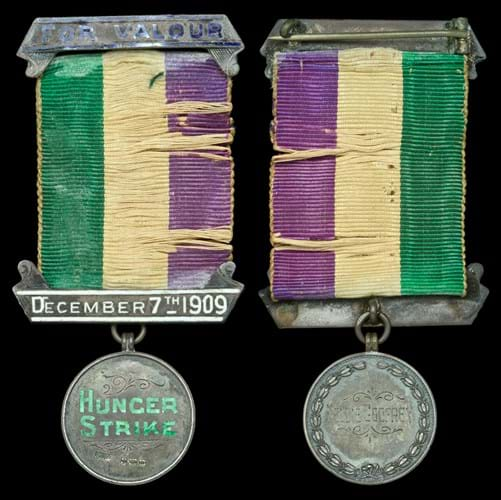
The recipient’s status as a Suffragette gives the answer. Nellie Godfrey was arrested and imprisoned for throwing a piece of iron at Churchill’s car as he attended an election rally in Bolton in December 1909.
The Women’s Social and Political Union (WSPU) Medal given to her is coming up at Dix Noonan Webb’s (DNW) auction in London on January 13 – a sale held online only because of lockdown restrictions.
It is expected to fetch £6000-8000 and the proceeds are being donated to the Fawcett Society, which campaigns for equality and women’s rights.
The silver medal is inscribed Hunger Strike, the reverse named Nellie Godfrey, the suspension bar dated December 7th. 1909.
It comes complete with integral top For Valour brooch bar, enamelled in the colours of the WSPU, and in its original case of issue. The inside silk interior lining of the lid with gold blocked inscription reads: Presented to Nellie Godfrey by the Women’s Social & Political Union in recognition of a gallant action, whereby through endurance to the last extremity of hunger and hardship a great principle of political justice was vindicated.
Arrested activist
Godfrey joined the WSPU in 1909, and was first arrested that summer, appearing before Bow Street Magistrates on July 9. She was arrested for a second time on December 7, charged with throwing a missile at Churchill’s motor car as he travelled to an election rally in Bolton in the run-up to the January 1910 General Election.
At the time Churchill, MP for Dundee, was President of the Board of Trade, and was undertaking a campaign tour of Lancashire. Suspecting trouble ahead of his address, the police had erected strong barricades along the route of his journey, but Godfrey managed to break through the timber barriers and threw the piece of iron.
It was wrapped in paper bearing the message Thrown by a woman of England as a protest against the Government’s treatment of political prisoners.
Appearing at Bolton Magistrates Court the following day, Godfrey pleaded guilty and was fined 40 shillings.
Refusing to pay, she was sentenced to seven days’ imprisonment. Released from Manchester Prison on medical grounds (most likely under the ‘cat and mouse’ system, whereby those political prisoners who embarked upon a hunger strike were released as soon as their condition started to deteriorate, in order that they should not become a political martyr), she returned to London, and two years later appeared again before Bow Street Magistrates on November 27, 1911.
Medal left to a neighbour
Christopher Mellor-Hill, head of client liaison (associate director) of DNW, said: “Not a lot is known about her. She lived in a flat in Muswell Hill, north London, next door to Sandra Lamberti (nee Andres) who had arrived here from Spain with her Gilbraltarian mother and Spanish father who was political refugee from Franco’s Spain.”
“Miss Godfrey befriended the family and helped teach Sandra to speak perfect English and became her adoptive grandmother. The medal was left to Sandra and her family when Nellie passed away in the late 1950s. Sandra passed away a few years ago, hence the family are selling it to aid the Fawcett Society – a campaign for gender equality and women’s rights at work, at home and in public life – to acknowledge Nellie’s life and values.”
Felicia Willow, Fawcett Society chief executive, added: “These precious items remind us of the dedication and bravery of the many women who fought for the vote, and the significant challenges they overcame along the way.”
Honours offered
Quite a few WSPU medals have come to auction in recent years, especially around 2018 which represented the 100th anniversary of women winning the vote (albeit for over 30s only until 1928).
Medals offered with extras such a research tend to make the highest prices. Another factor is the presence of silver badges in the form of a portcullis grill - actually brooches, designed by Sylvia Pankhurst. The portcullis represents parliament. Such brooches were first presented to former Suffragette prisoners at a mass demonstration at the Albert Hall on April 29, 1909.
The medal awarded to Anna Lewis came with two of these badges and sold for £22,000 at Lawrences in Crewkerne in May 2019.
Another noteworthy Suffragette medal auction result came at Nottingham saleroom Mellors & Kirk in March 2019 when the honour awarded to Selina Martin sold for a hammer price of £27,000 to a benefactor of the National Gallery of Victoria, Australia. It came a major archive of letters including ones from Christabel Pankhurst and other prominent figures in the movement and letters Martin wrote from prison.
During the anniversary year of 2018 Suffragette-related results included £40,000 for an archive including a ‘hunger strike’ medal awarded to Welsh-born Kate Evans. That was a house-record hammer price at Catherine Southon’s auction, paid by National Museum Wales.





